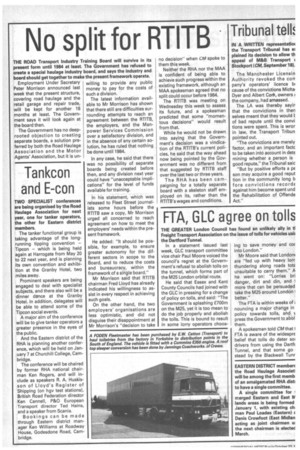No split for RTITB
Page 4

If you've noticed an error in this article please click here to report it so we can fix it.
THE ROAD Transport Industry Training Board will survive in its present form until 1984 at least. The Government has refused to create a special haulage industry board, and says the industry and board should get together to make the present framework operate.
Employment Under Secretary Peter Morrison announced last week that the present structure, covering road haulage and the retail garage and repair trade, will be kept for another 18 months at least. The Government says it will look again at the board then.
The Government has no deeprooted objection to creating separate boards, a solution preferred by both the Road Haulage Association and the Motor Agents' Association, but it is un willing to provide any public money to pay for the costs of such a division.
The latest information available to Mr Morrison has shown that there still are difficulties surrounding attempts to reach an agreement between the RTITB, the employers, and the Manpower Services Commission over a satisfactory division, and in the absence of any certain solution, he has ruled that nothing be done until 1984.
In any case, he said that there was no possibility of separate boards being created before then, and any division next year could have "unacceptable implications" for the level of funds available for training.
In his statement, which was released to Fleet Street journalists some hours before the RTITB saw a copy, Mr Morrison urged all concerned to reach agreement on how to meet the employers' needs within the present framework.
He added: "It should be possible, for example, to ensure greater autonomy for the different sectors in scope to the Board, and to reduce the costs and bureaucracy, within the framework of a single board."
Mr Morrison said that RTITB chairman Fred Lloyd has already indicated his willingness to assist in every respect in achieving such goals.
On the other hand, the two employers' organisations are less optimistic, and did not disguise their disappointment at Mr Morrison's "decision to take no decision" when CM spoke to them this week.
Neither the RHA nor the MAA is confident of being able to achieve such progress within the existing framework, although an MAA spokesman agreed that no split could occur before 1984.
The RTITB was meeting on Wednesday this week to assess its future, and a spokesman predicted that some "momentous decisions" would result from that.
While he would not be drawn into saying that the Government's decision was a vindication of the RTITB's current policies, he said that the way ahead now being pointed by the Government was no different from that suggested by RTITB staff over the last two or three years.
The RHA has been campaigning for a totally separate board with a skeleton staff employed on its, rather than the RTITB's wages and conditions.


















































































































